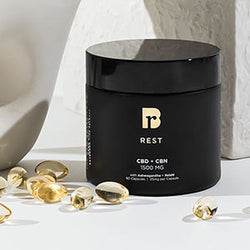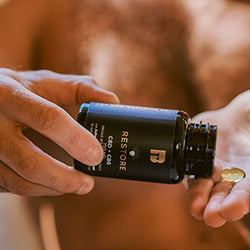
Modern life can often move so quickly that you hardly have time to stop and relax. It can make having a restful night's sleep seem like a pipe dream.
But sleep is as important for good health as diet and exercise. Good sleep improves your brain performance, mood, and health.
Not getting enough quality sleep regularly raises the risk of many diseases and disorders. These range from heart disease and stroke to obesity and dementia.
There’s more to good sleep than just the hours spent in bed, says Dr. Marishka Brown, a sleep expert at NIH. “Healthy sleep encompasses three major things,” she explains. “One is how much sleep you get. Another is sleep quality—that you get uninterrupted and refreshing sleep. The last is a consistent sleep schedule.”
People who work the night shift or irregular schedules may find getting quality sleep extra challenging. And times of great stress—like the current pandemic—can disrupt our normal sleep routines. But there are many things you can do to improve your sleep.
"Humans do not sleep as nature intended. Modernity has completely changed the amount of sleep sessions, duration of sleep, and when sleep happens." says Les Kollegian, co-founder of Raw Botanics. "As well, many people try to support better sleep with the use of synthetic sleep aids (i.e., melatonin) which are not good for you. We are doing our best to create 100% natural sleep aids with natural botanics and adaptogens, to combat the anxiety of modern society."
Sleep for Repair
Why do we need to sleep? People often think that sleep is just “down time,” when a tired brain gets to rest, says Dr. Maiken Nedergaard, who studies sleep at the University of Rochester.
“But that’s wrong,” she says. While you sleep, your brain is working. For example, sleep helps prepare your brain to learn, remember, and create.
Nedergaard and her colleagues discovered that the brain has a drainage system that removes toxins during sleep.
“When we sleep, the brain totally changes function,” she explains. “It becomes almost like a kidney, removing waste from the system.”
Her team found in mice that the drainage system removes some of the proteins linked with Alzheimer’s disease. These toxins were removed twice as fast from the brain during sleep.
Everything from blood vessels to the immune system uses sleep as a time for repair, says Dr. Kenneth Wright, Jr., a sleep researcher at the University of Colorado.
“There are certain repair processes that occur in the body mostly, or most effectively, during sleep,” he explains. “If you don’t get enough sleep, those processes are going to be disturbed.”
Sleep Myths and Truths
With age, your sleep requirements alter. Experts advise teens to receive between eight and ten hours a night, while children and teens should get at least nine. The majority of adults require at least seven hours of sleep per night..
There are many misunderstandings about sleep. One is that adults need less sleep as they get older. This isn’t true. Older adults still need the same amount. But sleep quality can get worse as you age. Older adults are also more likely to take medications that interfere with sleep.
Another sleep myth is that you can “catch up” on your days off. Researchers are finding that this largely isn’t the case.
“If you have one bad night’s sleep and take a nap, or sleep longer the next night, that can benefit you,” says Wright. “But if you have a week’s worth of getting too little sleep, the weekend isn’t sufficient for you to catch up. That’s not a healthy behavior.”
In a recent study, Wright and his team looked at people with consistently deficient sleep. They compared them to sleep-deprived people who got to sleep in on the weekend.
Both groups of people gained weight with lack of sleep. Their bodies’ ability to control blood sugar levels also got worse. The weekend catch-up sleep didn’t help.
On the flip side, more sleep isn’t always better, says Brown. For adults, “if you’re sleeping more than nine hours a night and you still don’t feel refreshed, there may be some underlying medical issue,” she explains.

The infographic above is a quick reference guide to sleep better. Please see the 10 tips below for more detailed information.
Getting a Better Night’s Sleep
- Stick to a sleep schedule. Go to bed and wake up at the same time every day, even on the weekends.
- Get some exercise every day. But not close to bedtime.
- Go outside. Try to get natural sunlight for at least 30 minutes every day.
- Avoid nicotine and caffeine. Both are stimulants that keep you awake. Caffeine can take 6–8 hours to wear off completely.
- Don’t take naps after mid-afternoon. And keep them short.
- Avoid alcohol and large meals before bedtime. Both can prevent deep, restorative sleep.
- Limit electronics before bed. Try reading a book, listening to soothing music, or another relaxing activity instead.
- Create a good sleeping environment. Keep the temperature cool if possible. Get rid of sound and light distractions. Make it dark. Silence your cell phone.
- Don’t lie in bed awake. If you can’t fall asleep after 20 minutes, get up and do a relaxing activity until you feel sleepy again.
- See your health care provider if nothing you try helps. They can determine if you need further testing. They can also help you learn new ways to manage stress.
Sleep Disorders
Some people have conditions that prevent them from getting enough quality sleep, no matter how hard they try. These problems are called sleep disorders.
The most common sleep disorder is insomnia. “Insomnia is when you have repeated difficulty getting to sleep and/or staying asleep,” says Brown. This happens despite having the time to sleep and a proper sleep environment. It can make you feel tired or unrested during the day.
Insomnia can be short-term, where people struggle to sleep for a few weeks or months. “Quite a few more people have been experiencing this during the pandemic,” Brown says. Long-term insomnia lasts for three months or longer.
Sleep apnea is another common sleep disorder. In sleep apnea, the upper airway becomes blocked during sleep. This reduces or stops airflow, which wakes people up during the night. The condition can be dangerous. If untreated, it may lead to other health problems.
If you regularly have problems sleeping, talk with your health care provider. They may have you keep a sleep diary to track your sleep for several weeks. They can also run tests, including sleep studies.
Common Signs of a Sleep disorder
Look over this list of common signs of a sleep disorder, and talk to your doctor if you have any of them on three or more nights a week:
- It takes you more than 30 minutes to fall asleep at night.
- You awaken frequently in the night and then have trouble falling back to sleep again.
- You awaken too early in the morning.
- You often don’t feel well rested despite spending 7–8 hours or more asleep at night.
- You feel sleepy during the day and fall asleep within 5 minutes if you have an opportunity to nap, or you fall asleep unexpectedly or at inappropriate times during the day.
- Your bed partner claims you snore loudly, snort, gasp, or make choking sounds while you sleep, or your partner notices that your breathing stops for short periods.
- You have creeping, tingling, or crawling feelings in your legs that are relieved by moving or massaging them, especially in the evening and when you try to fall asleep.
- You have vivid, dreamlike experiences while falling asleep or dozing.
- You have episodes of sudden muscle weakness when you are angry or fearful, or when you laugh.
- You feel as though you cannot move when you first wake up.
- Your bed partner notes that your legs or arms jerk often during sleep.
- You regularly need to use stimulants to stay awake during the day.

Getting Better Sleep
If you’re having trouble sleeping, hearing how important it is may be frustrating. But simple things can improve your odds of a good night’s sleep.
Treatments are available for many common sleep disorders. Cognitive behavioral therapy can help many people with insomnia get better sleep. Medications can also help some people.
Many people with sleep apnea benefit from using a device called a CPAP machine. These machines keep the airway open so that you can breathe. Other treatments can include special mouthguards and lifestyle changes.
For everyone, “as best you can, try to make sleep a priority,” Brown says. “Sleep is not a throwaway thing—it’s a biological necessity.”
Still can’t fall and stay asleep?
We’ve all been there. Our lives are constantly changing... like the addition of a new baby or furry family member, a hectic work schedule that just doesn’t let your brain turn off before 1am, or a suddenly snoring partner. I think you get the point. Getting in those very important 8 hours of sleep isn’t always as easy as setting a regular bedtime and stopping the caffeine before 6pm. For those cases where you just need a little extra help - try turning towards nature. Functional mushrooms like lion’s mane, ashwagandha, and reishi have been used in Chinese and Ayurvedic healing traditions for thousands of years. And today they’re widely available in the West by reputable health brands.
Our recommendation? Try Raw Botanic’s REST line of sleep solutions. Raw Botanics is the first company to combine functional mushrooms, adaptogens and cannabinoids to enhance health benefits with an all natural approach. Over 93% of people that use REST claim they have a deeper REM sleep (see the chart below for sleep stages) and they actually have the data to prove. helps you unwind and brighten your outlook while helping to enhance your mental stamina and focus.
These solutions are nano-amplified to increase bioavailability and provide quicker onset action. This means you can consume less product because your body is able to efficiently absorb more of it, so you get more for less!
The products come in two easy to use delivery formats. You can try either the great tasting REST tincture with tasting notes of coconut, citrus, and ginger or if you aren't the "tincture type, the product also comes as REST Softgels. Bottom line, If you're ready to fall asleep faster and stay asleep longer, try the REST product line.








